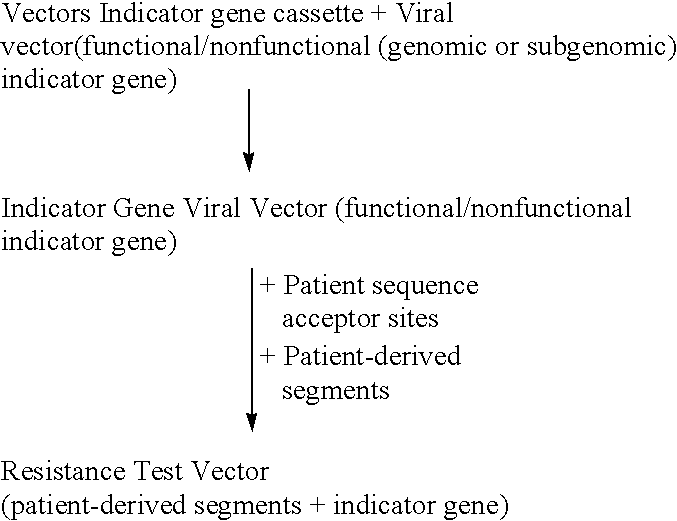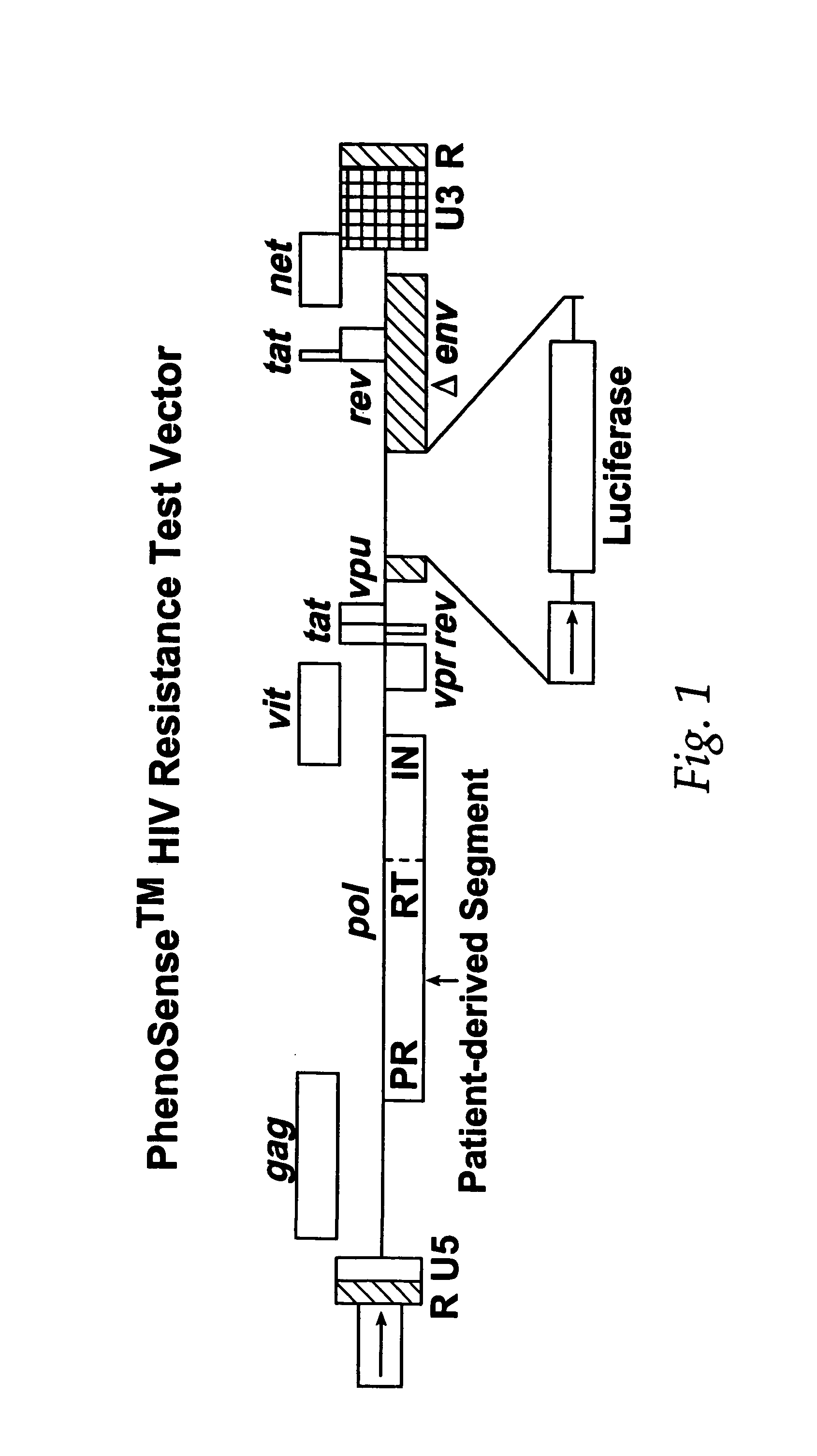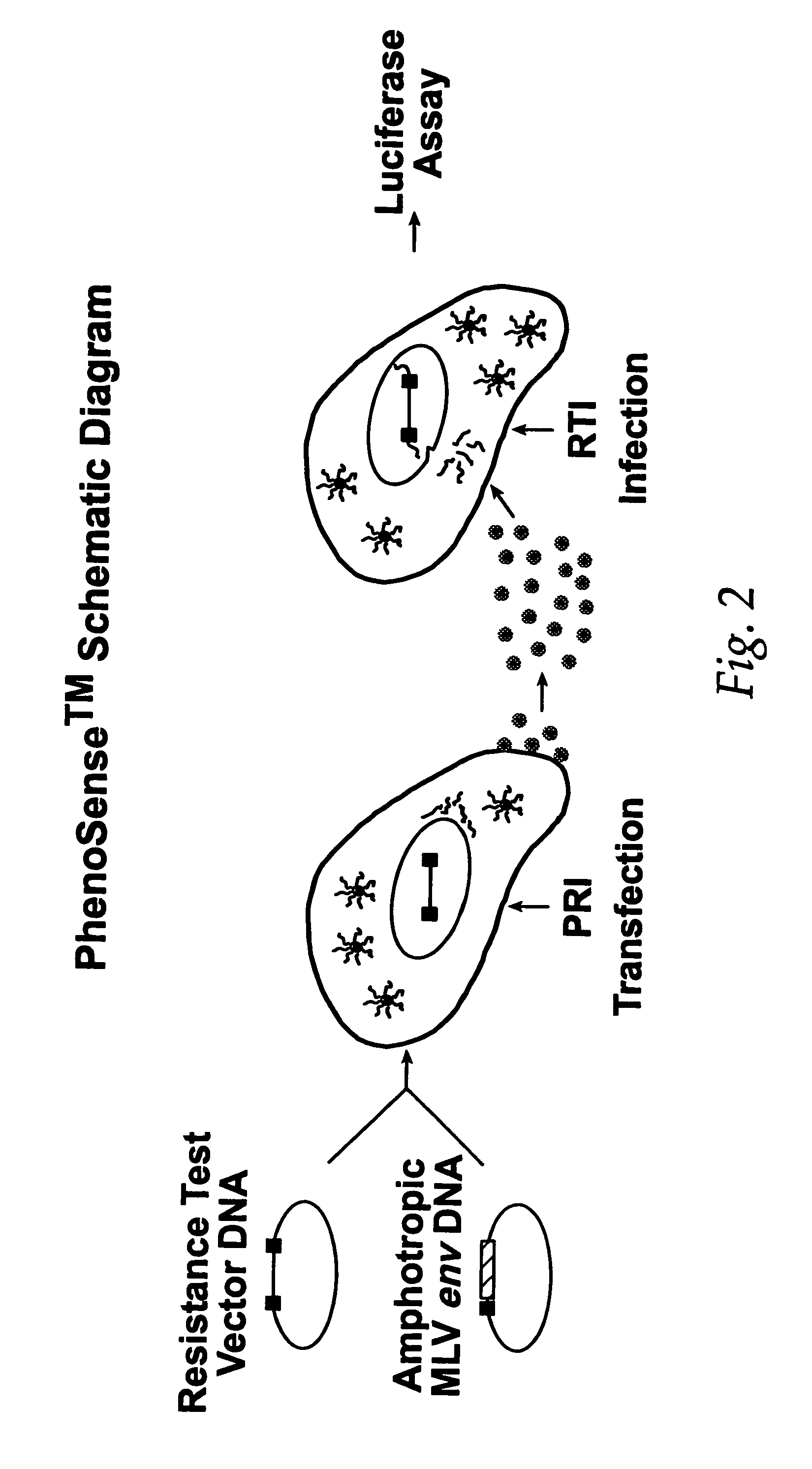Means and methods for monitoring protease inhibitor antiretroviral therapy and guiding therapeutic decisions in the treatment of HIV/AIDS
a protease inhibitor and antiretroviral therapy technology, applied in the field of antiretroviral drug susceptibility and resistance tests, can solve the problems of cd4 depletion and disease progression, small proportion of the total viral load, and may have a replication or competitive disadvantage, so as to identify and assess the fitness of the virus infecting
- Summary
- Abstract
- Description
- Claims
- Application Information
AI Technical Summary
Benefits of technology
Problems solved by technology
Method used
Image
Examples
example 1
Phenotypic Drug Susceptibility and Resistance Test Using Resistance Test Vectors
[0218]Phenotypic drug susceptibility and resistance tests are carried out using the means and methods described in U.S. Pat. No. 5,837,464 (International Publication Number WO 97 / 27319) which is hereby incorporated by reference.
[0219]In these experiments patient-derived segment(s) corresponding to the HIV protease and reverse transcriptase coding regions were either patient-derived segments amplified by the reverse transcription-polymerase chain reaction method (RT-PCR) using viral RNA isolated from viral particles present in the serum of HIV-infected individuals or were mutants of wild type HIV-1 made by site directed mutagenesis of a parental clone of resistance test vector DNA. Isolation of viral RNA was performed using standard procedures (e.g. RNAgents Total RNA Isolation System, Promega, Madison Wis. or RNAzol, Tel-Test, Friendswood, Tex.). The RT-PCR protocol was divided into two steps. A retrovir...
example 2
An in vitro Assay Using Resistance Test Vectors and Site Directed Mutants to Correlate Phenotypes and Genotypes Associated with HIV Drug Susceptibility and Resistance
[0227]Phenotypic susceptibility analysis of patient HIV samples Resistance test vectors are constructed as described in example 1. Resistance test vectors, or clones derived from the resistance test vector pools, are tested in a phenotypic assay to determine accurately and quantitatively the level of susceptibility to a panel of anti-retroviral drugs. This panel of anti-retroviral drugs may comprise members of the classes known as nucleoside-analog reverse transcriptase inhibitors (NRTIs), non-nucleoside reverse transcriptase inhibitors (NNRTIs), and protease inhibitors (PRIs). The panel of drugs can be expanded as new drugs or new drug targets become available. An IC50 is determined for each resistance test vector pool for each drug tested. The pattern of susceptibility to all of the drugs tested is examined and compar...
example 3
Using Resistance Test Vectors to Correlate Genotypes and Phenotypes Associated with Changes in PRI Drug Susceptibility in HIV
Phenotypic Analysis of Patient 0732
[0231]A resistance test vector was constructed as described in example 1 from a patient sample designated as 0732. This patient had been previously treated with nelfinavir. Isolation of viral RNA and RT / PCR was used to generate a patient derived segment that comprised viral sequences coding for all of PR and aa 1–313 of RT. The patient derived segment was inserted into an indicator gene viral vector to generate a resistance test vector designated RTV-0732. RTV-0732 was tested using a phenotypic susceptibility assay to determine accurately and quantitatively the level of susceptibility to a panel of anti-retroviral drugs. This panel of anti-retroviral drugs comprised members of the classes known as NRTIs (AZT, 3TC, d4T, ddI, ddC, and abacavir), NNRTIs (delavirdine, nevirapine and efavirenz), and PRIs (indinavir, nelfinavir, ri...
PUM
| Property | Measurement | Unit |
|---|---|---|
| temperatures | aaaaa | aaaaa |
| volumes | aaaaa | aaaaa |
| concentration | aaaaa | aaaaa |
Abstract
Description
Claims
Application Information
 Login to View More
Login to View More - R&D
- Intellectual Property
- Life Sciences
- Materials
- Tech Scout
- Unparalleled Data Quality
- Higher Quality Content
- 60% Fewer Hallucinations
Browse by: Latest US Patents, China's latest patents, Technical Efficacy Thesaurus, Application Domain, Technology Topic, Popular Technical Reports.
© 2025 PatSnap. All rights reserved.Legal|Privacy policy|Modern Slavery Act Transparency Statement|Sitemap|About US| Contact US: help@patsnap.com



